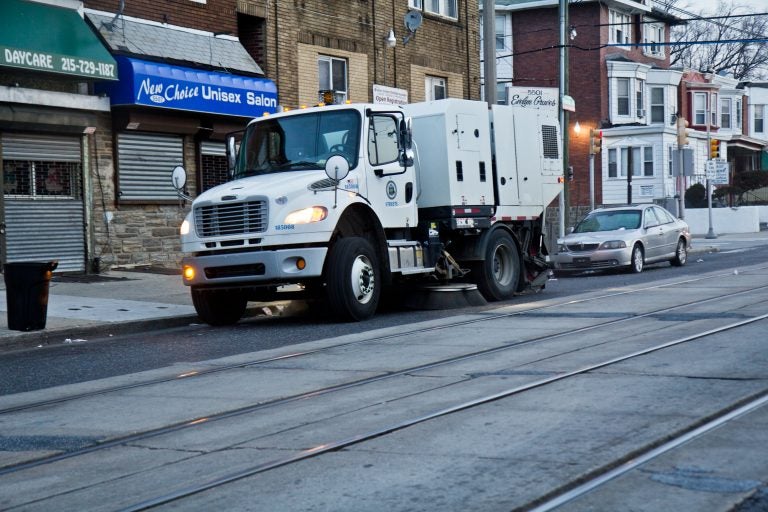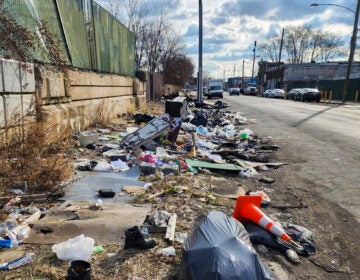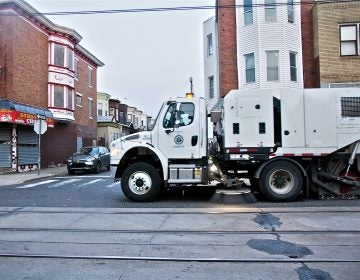Filthadelphia no more? Kenney seeks to ‘vastly’ increase street cleaning
Philadelphia is currently the only large municipality without a comprehensive street sweeping plan.

A city street sweeper cleans Chester Avenue in Southwest Philadelphia. (Kimberly Paynter/WHYY)
This story originally appeared on PlanPhilly.
—
Mayor Jim Kenney announced a new anti-litter proposal in his budget address that could bring the city a step closer to shedding the unwanted sobriquet “Filthadelphia.”
Kenney said he would seek to nearly quadruple funding for the city’s skeletal street cleaning program.
“This budget includes $2.3 million next year and $11.7 million over the life of the plan to implement street sweeping in more neighborhoods,” he said, in a Thursday budget address.
Philadelphia is currently the only large municipality without a comprehensive street sweeping plan. This funding bump is the first substantial increase to the city’s street cleaning efforts in decades.
Decades of budget cuts and complaints from residents over street cleaning-related parking enforcement led the city to reduce cleaning operations to only certain major streets. By 2004, the Streets Department was devoting just $400,000 to litter collection.
Despite campaign pledges from Kenney to take on the city’s litter problem, by 2018 the department was still spending just $850,000 on sweeping from the agency’s $90 million budget.
A WHYY/PlanPhilly investigation last year found that even though the Philadelphia Parking Authority was still ticketing cars parked in street cleaning lanes, the city was rarely performing even these nominal duties.
Streets Commissioner Carlton Williams said the new funding increase would allow for “vast” improvements to the current cleaning program.
“It will double the size of our current fleet. This allows us to add another 15 broom (trucks) and 40 laborers,” he said. “We’ll be able to expand the program vastly as a result of this budget increase.”
Still, the Streets Department’s internal estimates state that it would cost $3 to $5 million annually to maintain citywide cleaning, along with tens of millions more in upfront costs to augment existing street cleaning equipment.
Williams said the initial funding boost would restore cleaning to six targeted neighborhoods –– to be announced later this spring –– as part of a previously announced pilot program.
Both the mayor and Williams acknowledged that parking is still a touchy subject. Sweeper trucks require unobstructed access to parking lanes to clean trash out of the curb line, but residents gripe about weekly parking tickets that often result from these restrictions.
The commissioner said the city would only ask residents to avoid blocking parking lanes on designated sweeping days –– at least at first. In an unconventional move, the city had announced that it would seek to use street crews armed with leaf blower-like devices to push detritus from behind parked cars and into the roadway.
“We’re going to be using mechanical blowers to minimize the requirement that people use their cars,” Williams said. “But we will encourage residents to move their cars. And when they don’t, we’ll use blowers to blow the trash into the street where the trucks can be effective.”
The Mayor’s Office said the new budget includes an additional $250,000 to enhance a separate cleaning program managed by the Commerce Department along certain business corridor.
WHYY is your source for fact-based, in-depth journalism and information. As a nonprofit organization, we rely on financial support from readers like you. Please give today.







